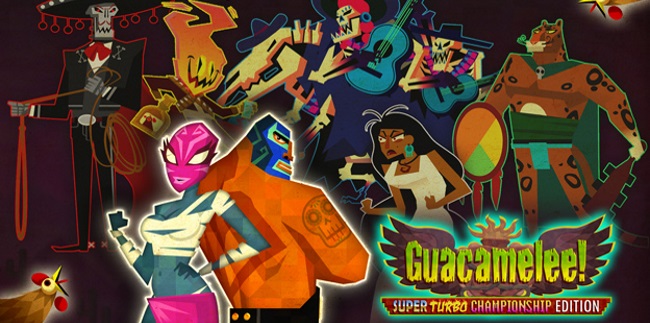
When Guacamelee! launched on PS3 and PS Vita last year, I had a really great time playing it. As one of my favourite games of 2013, as well as one of the best games on the Vita to this day, this is a game that I was happy to see a re-release on the new generation consoles. Drinkbox’s metroidvania, Mexican folklore inspired action platformer is back, and with a considerable vengeance. As well as all of the game’s original content and the DLC following it, Guacamelee! Super Turbo Championship Edition adds new areas, new abilities, and new costumes, amounting to a much larger package than the original release. To accommodate all of this new content though, the game has been structurally adjusted and reshaped; so is this new package the definitive release for Guacamelee newcomers? And is it worth coming back to for those who played the original? The short answer is yes. Here’s the long answer:
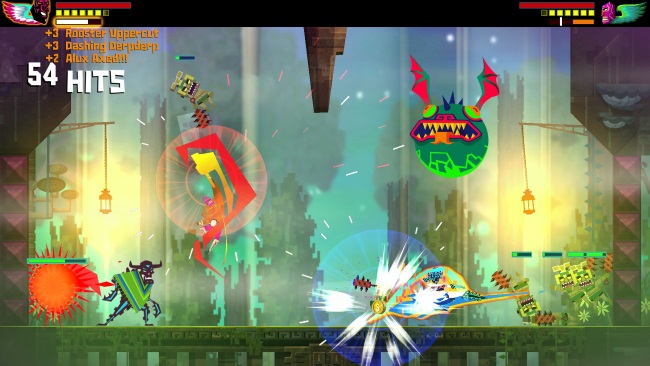
Juan Aguacate is just your average agave farmer. However, having grown up alongside El Presidente’s daughter, he naturally develops a little bit of a crush on her. So, of course, when an evil skeletal charro (Mexican cowboy, I guess?) by the name of Carlos Calaca appears, kidnapping Juan’s love interest, he has something to say about it. In an attempt to fight Calaca and save the princess-type-lady, Juan doesn’t do especially well, though. In fact, he actually get’s a little bit murdered. Luckily for him though, in Guacamelee, the realm of the dead is much like the realm of the living, just a little bit darker, with skeletons and things of this nature. In this alternate dimensional plane, Juan comes across Tostada, a female luchador who not only gives him a magical mask allowing him to return to the realm of the living, but who becomes a second playable character. From here, Juan and Tostada begin a mission to stop Calaca from sacrificing El Presidente’s daughter and taking the worlds of the living and the dead as his own.
Juan and Tostada will overcome challenges on their adventure using one of two methods; combat or platforming. Believe it or not, I found Guacamelee’s combat mechanics to be most comparable to the Super Smash Bros. series. Much like Nintendo’s brawler, the core of the luchadors’ technique is a standard attack which differs depending on the direction aimed, as well as a collection of special attacks – one for each direction, as well as neutral. While normal attacks can be used at will, special attacks will drain a stamina bar, so their strength can’t be abused too much.
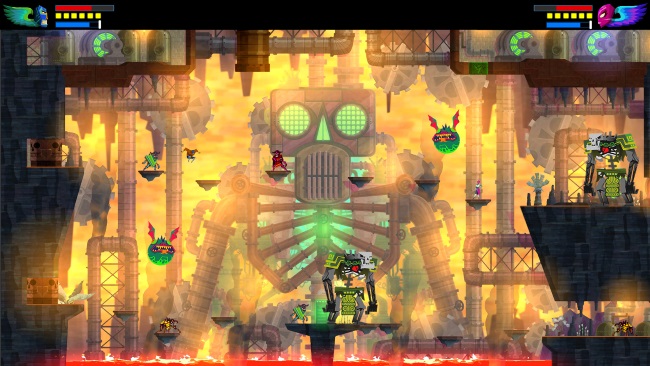
Two other major pillars of Guacamelee’s combat system are throwing and rolling. Throws can be executed on an enemy after their health has been lowered to a certain point. They might not be the most damaging, but throwing an enemy at his comrades means lowering the group’s health too. Rolling is used to evade enemy attacks (who’d have thought?), as well as to cover some ground in the middle of a combo. The satisfaction of knocking an enemy back, rolling towards him, and continuing the combo never wore off. This open-ended nature of Guacamelee’s mechanics provides a robust selection of potentially endless combos, while keeping a simple control scheme and base concept. Combat did start to feel a tiny bit bland to me at certain points, but these thirsts were always quenched by an introduction of a new enemy type, game mechanic or additional move to start trying out.
The platforming relies on a lot of these mechanics, as well. Special moves don’t only deal major damage, but can thrust either character in the direction they’re performed in. So, where a regular jump might not be enough to clear a gap, a jump followed by an in-air special move might be. Using various abilities to keep a jump going or change Juan’s trajectory opens the doors to interesting and challenging precision based platforming challenges, of which there are many. To further deepen the challenge, switching between the realms of the living and the dead is mixed into gameplay. This could mean altering the dimension to make platforms or walls appear or disappear multiple times in just a single string of jumps. As if this wasn’t enough to provide a satisfying set of challenges, several other traversal based techniques are unlocked and needed throughout the game. It can get pretty intense at times.
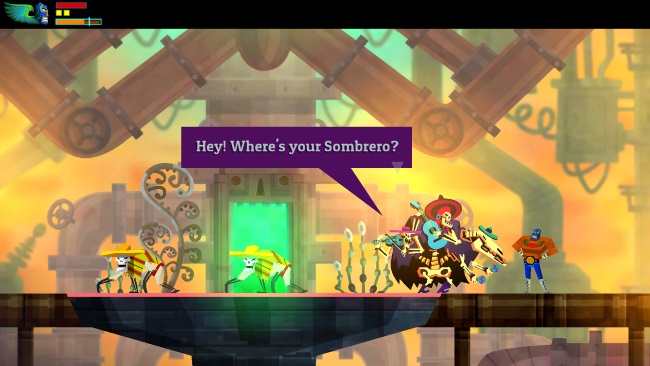
Of course, a complicated platformer will always live and die with the quality of its levels, so it’s lucky that Guacamelee STCE features some awesome design work. Backtracking is absolutely necessary to find collectibles as well as health, stamina and Intenso upgrades, but there is still enough content hidden in these areas that returning with new moves will likely open more paths than you expected. A great map system helps, as well, making travelling back and forth to new and old areas a breeze. Secrets will be shown on the map once you’ve come close enough to see them too – a very useful touch for a game which will have you heading back to open that chest you couldn’t reach before.
Unlike most re-releases, the Super Turbo Championship Edition is a fairly substantial expansion upon the original game. What’s great is how much of the content is woven into the already beautiful fabric of Guacamelee. You’ll be collecting a new currency, using the new Intenso mode, and buying costumes early in the game as if you always could have done so, and it doesn’t disrupt the design of the debut release. But with that said, I don’t feel that I can say the same for the new areas of the game. Where the Infierno challenges (added as DLC to the original game) provided awesome side/post-game content, the new sections of STCE’s map are squeezed into the game’s main path.
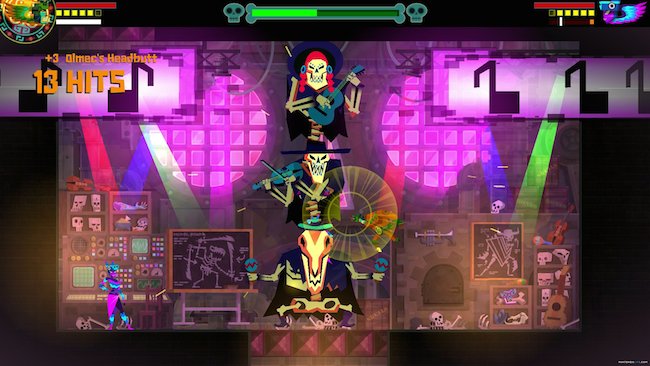
Admittedly, the story is more comedic than deep, and following it isn’t all that important or difficult most of the time, but the new content felt pretty disruptive both to the narrative and the flow of gameplay to me. They’re fantastic additions with an interesting side-plot all on their own, but why not have them be optional and out of the way, rather than forced right into the middle? I’m sure Drinkbox wanted to ensure that their hard work was seen, but I’m also sure they could have done so more elegantly than this. Sending me to the place I would have been heading in the original game, only to cut me off with dialogue and warp me somewhere else isn’t ideal. No, it’s not terribly handled (I’m sure new players won’t even notice), and there’s actually one example of this restructuring in the game that I thought was really clever, but for an expertly polished game, it’s my most noteworthy complaint.
One thing which has been consistent with every version is the visuals. Guacamelee’s crisp, colourful visual design offers a level of quality seen throughout all of the game. Every area of the game is rich, vibrant, and just plain cool to look at, complimented by fantastic character design and fluid animation. Along with great (albeit repetitive) music, the presentation of Guacamelee was always fantastic, and it’s just as good now on the new generation systems.
 Simple but deep mechanics
Simple but deep mechanics
 Excellent world and level design
Excellent world and level design
 Entertaining characters and story
Entertaining characters and story
 Outstanding visual and audio presentation
Outstanding visual and audio presentation
 New content feels a bit forced at times
New content feels a bit forced at times
Guacamelee! was an excellent game when it first released, and the Super Turbo Championship Edition only adds to that. Loads of new content makes an already awesome experience even better, and though the way it’s interjected is flawed, the new content is just as great as the original content. Guacamelee! provides spectacular platforming, intense combat, as well as interesting exploration in a wonderful world full of great ideas, new and old.











